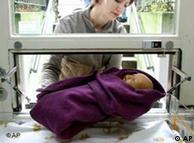 |
| A Johannesburg orphanage says its baby hatch gives desperate mothers an alternative to dumping their babies in rubbish bins |
I saw this article in
BBC News, "'Baby bin' to save South Africa's unwanted children. Mothers in Johannesburg's Berea suburb can anonymously leave their newborns in this 'Door of Hope.' Also referred to as 'baby hatches,' this method of allowing mothers to place their unwanted children in institutional care is not new. Italy established the first foundling wheels in 1198. In Florence, foundling homes were accepting newborns in the thirteenth century. The Innocenti Foundling Hospital was designed by Renaissance architect Filippo Brunelleschini which opened its doors in 1445. It is still in operation. Mothers who did not want to directly hand their babies to the hospital could place them in a basin to the right of the front portico beneath a window that opened to a space where a woman was always on duty to attend to the abandoned infant.
Throughout Europe, foundling wheels have existed since the 17th and 18th centuries. Today, in many European countries (Germany, Austria, Belgium, the Czech Republic and Hungary to name a few) as well as in Malaysia, Kuala Lumpur, Japan, Brazil, Canada and the US, it is legal for mothers to anonymously abandon their babies via the baby hatch in hospitals and social welfare agencies, though the details vary by country and state. In the US, all 50 states have a type of 'Safe Haven' law that permits mothers who choose not to keep their infants to legally leave them in official care. In South Asia, Pakistan has over 300 baby hatches. In both Pakistan and India, this practice provides an alternative to female infanticide. This killing of infant girls is motivated by the pressure of providing dowries for daughters among the poor as well as the traditional preference for boys (see
the Economist's, Missing Girls in India and
Bangladesh and India: violence against women ).
In the 17th an 18th centuries, these infants were adopted, fostered out to families as farm labor or conscripted by the state into the military or into work programs. Today, many will find new homes or be cared for as sons as daughters if not in families, by state or social welfare agencies. At the very least baby bins can provide hope to replace the despair heaped upon children brought into the world under circumstances that cannot sustain them.
To read the full article on baby bins in BBC news click
here.
 |
| Baby hatch, Germany |


